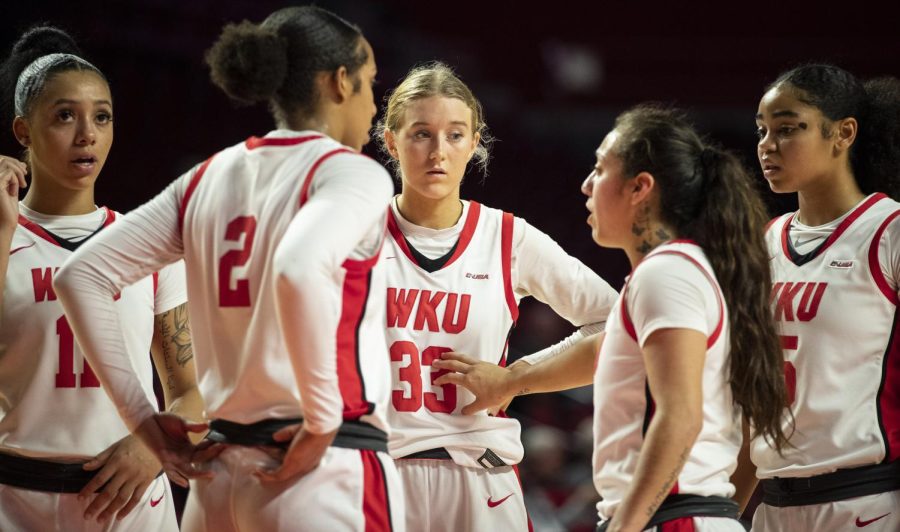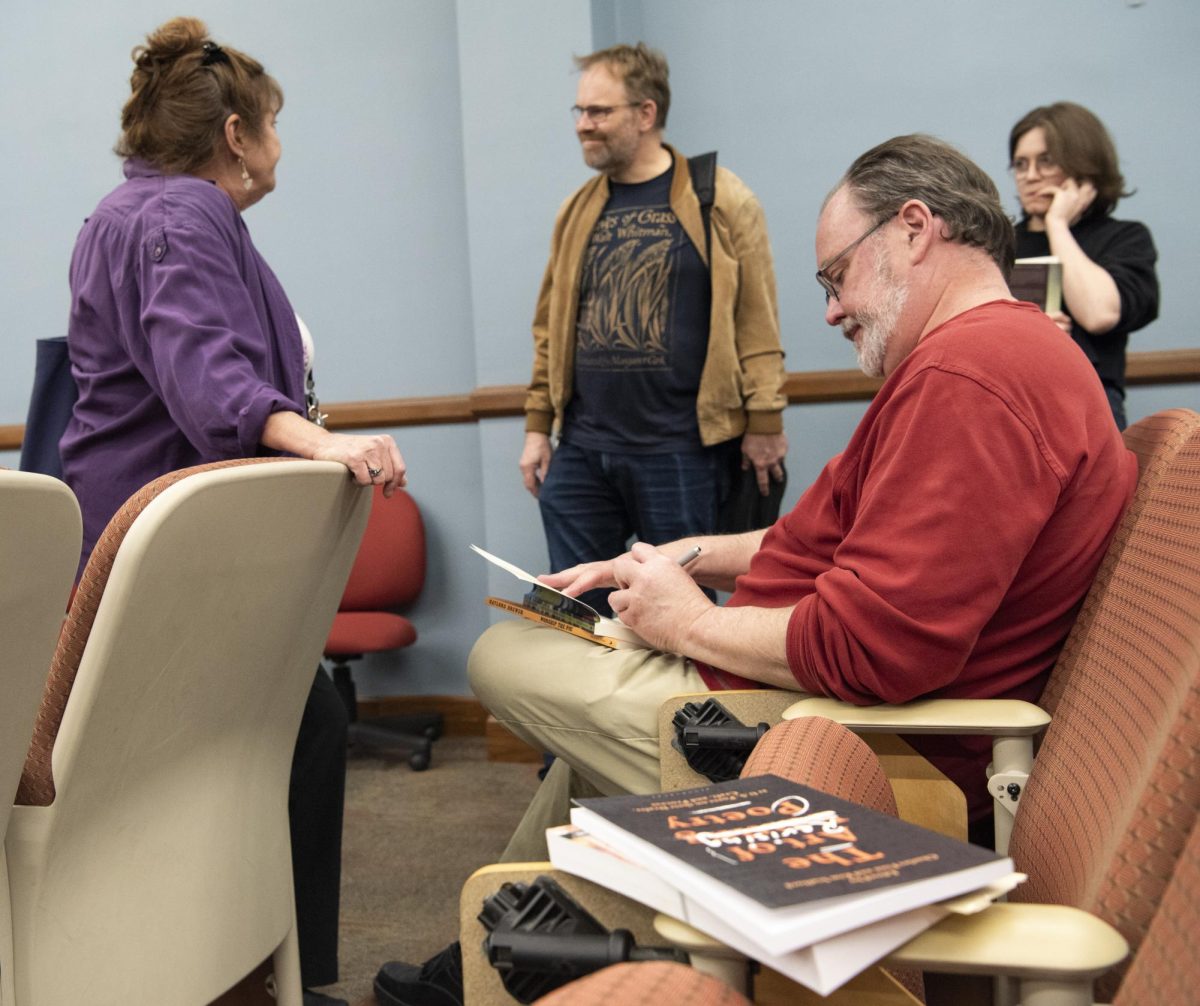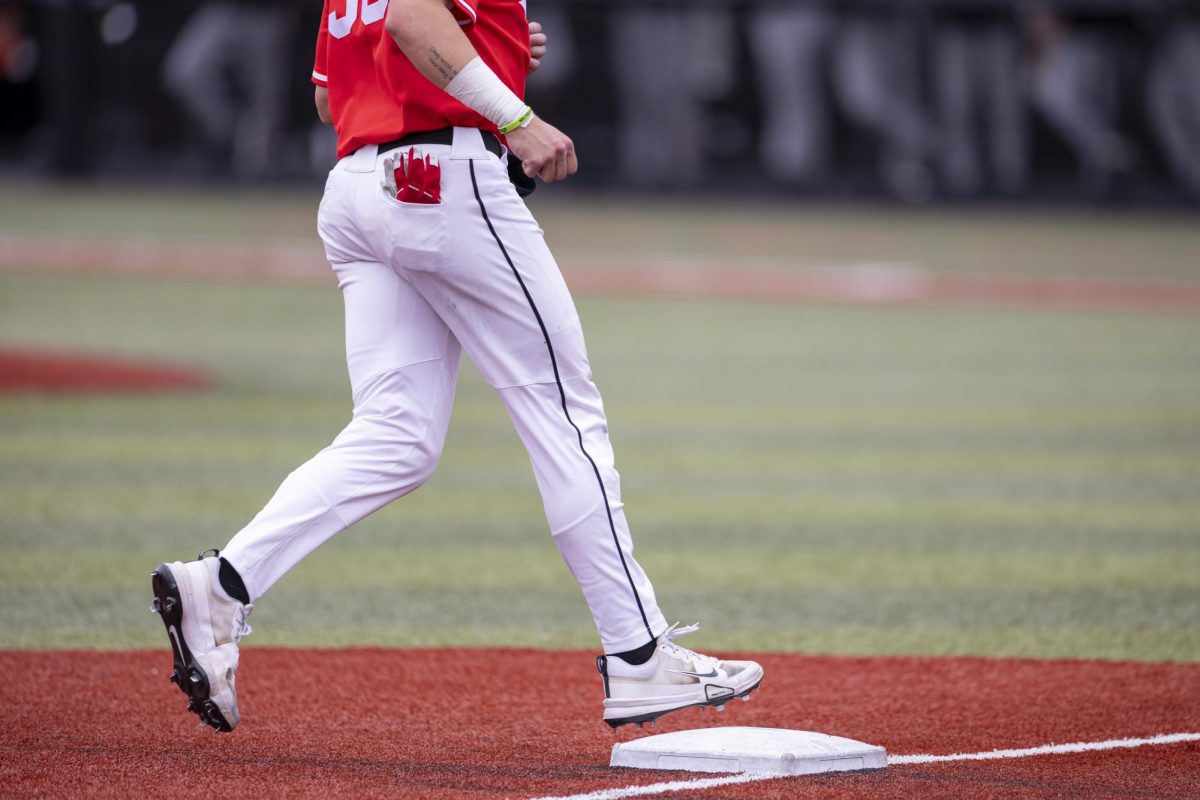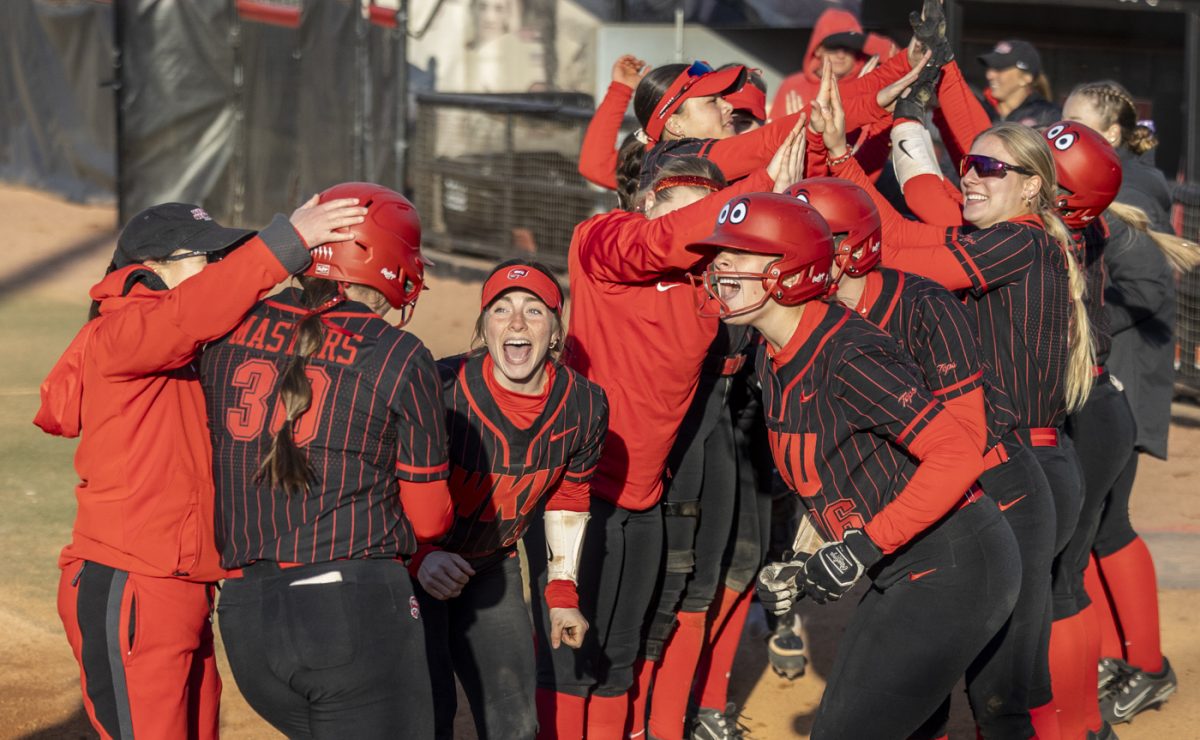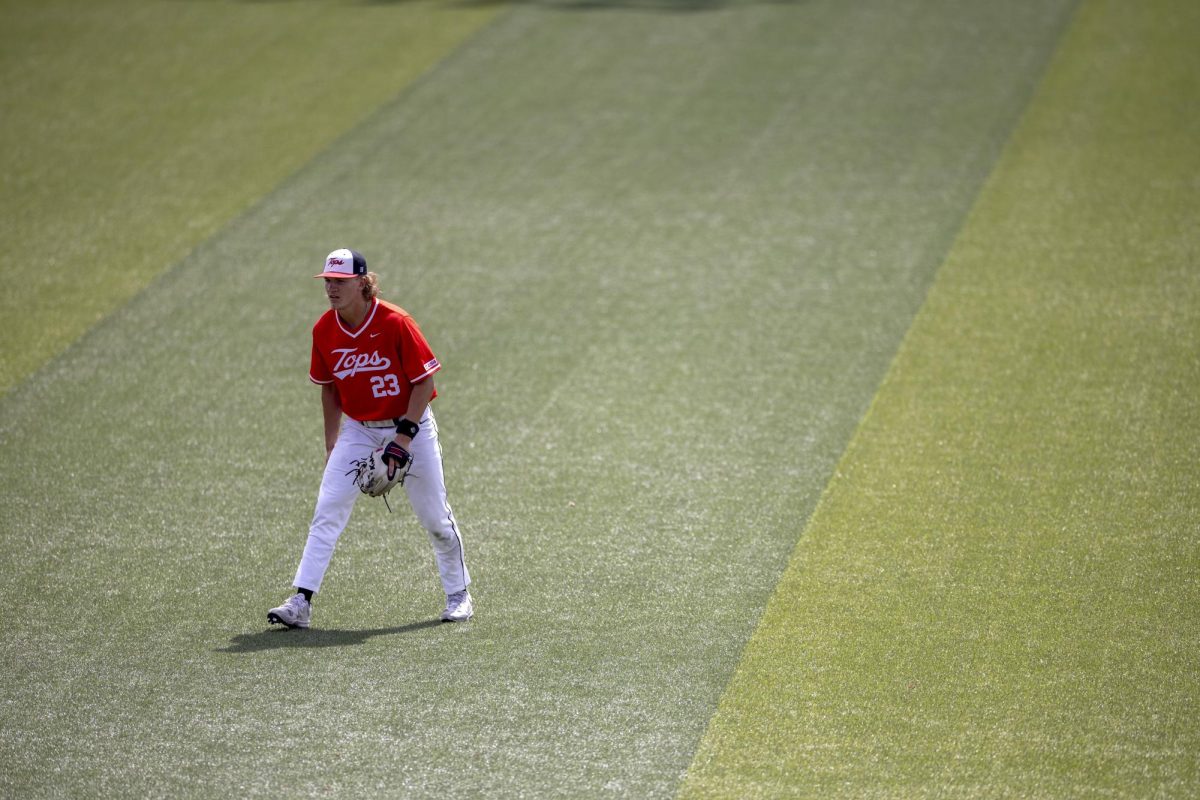‘A source of frustration’: WKU fan presence lags behind women’s athletic successes
The Lady Toppers have an on court meeting during the matchup with Lipscomb in E.A. Diddle Arena on Tuesday, Nov. 29, 2022. WKU lost 84-66.
November 30, 2022
Since Western Kentucky University joined Conference USA in 2014, WKU has claimed 37 conference championships. Of those 37, women’s athletics are responsible for 27 titles, yet there is still a lack of support surrounding women’s sporting events.
At the end of the 2021-22 season, WKU Athletics reported Men’s Basketball pulled in a cumulative attendance of 69,078 while the Lady Toppers had only brought in a total of 11,407 fans.
The Lady Toppers ended last season with a 18-12 record while the men finished 19-13, both teams accumulating a 60% win percentage with identical 11-7 records against C-USA opponents.
For the 2022 operating year, WKU Softball is allocated $732,562 for its season while WKU Baseball is given $1,095,207. The women’s 2022 season record was 38-13 as opposed to the men’s mark of 18-36.
Football had the largest operating budget of $7,062,438. In 2015, WKU Football was ranked 24th in NCAA Division I football final rankings, making the teams first and only top 25 appearance ever. WKU Volleyball is consistently ranked in the top 25 and was afforded $842,207.
At WKU there are eight women’s teams versus the mens’ six, but men’s athletics are overall allocated $6,137,380 more than women’s athletics at WKU.
WKU is not the only school struggling to balance budgets and fan bases between men’s and women’s athletics. A report released in 2021 by the NCAA revealed that on average, there are large disparities between men’s and women’s athletic budgets at all universities.
“That is a source of frustration for me and all of us in the Athletic Department,” WKU Athletic Director Todd Stewart said. “We promote them in a very similar manner, yet there is certainly a disparity in the attendance numbers. While this is the case in most programs throughout the country, as fans typically go to football and men’s basketball games in much larger numbers than other sports, we still have to get better in this area and get more people to attend our women’s sporting events.”
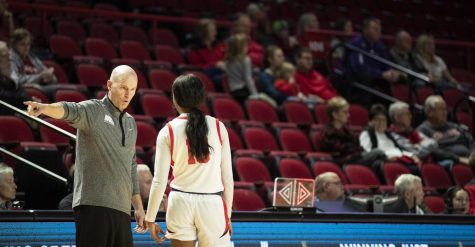
According to the United Nations Educational, Scientific, and Cultural Organization, 40% of all athletes are women, but women’s sports only receive 4% of all sports media coverage. UNESCO also reports that of the 4% media coverage female athletes receive, it can often be negative.
The NCAA has been forced to adhere to its own rules and federal laws after the lack of resources provided to women’s teams as opposed to the men’s teams in the 2021 March Madness tournament.
After female athletes received far worse accommodations than their counterparts, such as training equipment, merchandise and food, many athletes took to social media exposing the inequalities.
Advertisement and media coverage play large parts in fan participation. Team performance also contributes, but if there is no coverage, then the public may be left in the dark. Despite the NCAA’s shortcomings in recent years in relation to equality between women’s and men’s athletics, WKU emphasizes the use of social media in sporting events.
Flyers for men and women’s games are handed out and distributed together. Teams also have similar media content for social media and promos during games.
Outside of advertisement, budget and championships there also is a lack of representation in the stands. In the fall of 2021, 62.7% of undergraduate students at WKU were female. Despite over half of WKU’s population being made up by women, popularity and support of WKU women’s sporting events is still drastically less than men’s.
Women’s basketball head coach Greg Collins does not want to point a finger at one reason or assume why people don’t come to certain sporting events. Instead, he wants to focus on how to draw more attention to all women’s teams.
“I don’t know that there’s a specific thing that you can point to and say ‘that’s why people don’t show up.’[…] I do think those people who only go to football games or only go to men’s basketball games are missing out,” Collins said. “The women’s sports here at WKU compete at a high level and are a lot of fun to watch. Travis Hudson and his [volleyball] team have won championship after championship. If you’re a WKU fan, that should excite you.”
WKU Volleyball has had record-breaking attendance in recent years, but was still ranked 49 out of 50 teams in NCAA Division I volleyball for top home attendance leaders in 2021 with an average of 861 fans per game.
The Hilltoppers’ most notable home crowd of the 2022 season showed out against the No.3 ranked Louisville Cardinals. The game drew an enormous crowd of 3,811 fans, the third-largest crowd in WKU Volleyball history.
The Hilltoppers are currently ranked No. 22 in the nation. WKU Volleyball holds six regular season titles, two East Division and seven C-USA tournament championships since joining C-USA in 2014.
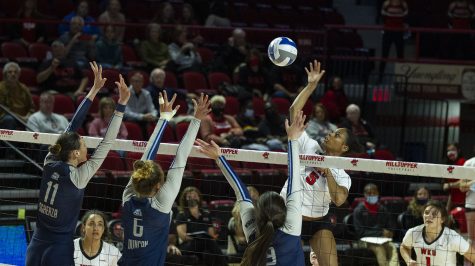
Middle hitter for WKU volleyball, Lauren Matthews, has been recognized many times by C-USA during her five-year career on the Hill. In 2021, Matthews set a NCAA single-match hitting record of .929 in WKU’s match against Florida International University. This past October she collected her 500th kill as a Hilltopper.
The middle hitter looks forward to seeing the team and its fanbase continue to grow even more.
“The fan attendance means a lot to us because it truly helps fuel us. The fan base for Western Kentucky Volleyball has improved so much during my time here and we are all so grateful for them and their support,” Matthews said.
While volleyball continues to draw larger crowds, this concept does not appear to spread to other women’s teams such as soccer or softball. Neither team made it in the NCAA DI top attendance leaders in 2019, the latest data available.
However, WKU is making an effort to be on top of the issue and attempting to emphasize to fans the importance of female athletics on the Hill. The new softball and soccer complex that the school broke ground on in August accomplishes just that.
Currently, the soccer team’s locker room is housed in Houchens-Smith Stadium while the softball team’s locker room is in Diddle Arena. Neither of which are in proximity to the soccer and softball fields.
The new complex that is being built next to the fields will include locker rooms for each team, office spaces, practice facilities, athletic training space, meeting space and room for visitors and officiators.
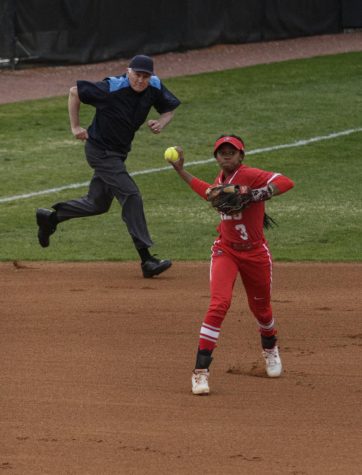
“Our soccer and softball programs have been extremely successful on and off the field, and they are tremendous representatives of WKU. They certainly deserve to have their own complex in close proximity to where they practice and play,” Stewart said.
Building a new facility may not seem like it would contribute to coverage or equity in sports, but lays a foundation for women’s athletics at WKU.
“Once the complex is completed, we will be able to have the coaches’ offices, locker rooms, and other necessities at our fingertips instead of having to run from building to building on campus using other sports facilities,” WKU Softball infielder TJ Webster said.
Not only does a new facility level the playing fields between men’s and women’s sports, but by giving a team their own facility it tells the rest of the world the importance of women’s athletics.
Head softball coach Amy Tudor remembers being excited to represent WKU as part of the first softball team at WKU in 2000. During her time on the Hill as a student athlete, the team didn’t have a practice facility or locker room. The new complex opens many more opportunities.
“I know that this [the softball and soccer complex] will be a new representation and great pride for our program going forward,” Tudor said.
There is much support that comes from within athletics when it comes to drawing attention to sporting events on the Hill. Luke Frampton, sixth year guard for men’s basketball, finds part of the answer in solidarity amongst all the athletic teams at WKU.
“It’s tough with our schedule to get out and support other teams, but we love to do that when we can,” Frampton said. “Especially in basketball, our conference games are opposite each other, so in the non-conference games, we try to get out and watch as many women’s games as we can as a team.”
Men’s basketball head coach Rick Stansbury takes a similar stance as Frampton.
“I think we have to be supportive of one another. We all love Western Kentucky and we’re all playing or coaching for Western Kentucky for a reason. Those reasons might be different, but our love for this school is the same,” Stansbury said.
Attending sporting events on the hill is free for WKU students which creates the possibility for a large fan base. As exposure of women’s sports grows not only at WKU, but globally, there are hopes this will aid viewership and attendance as well.
Sports reporter Molly St. Clair can be reached at molly.st.clair185@topper.wku.edu.

